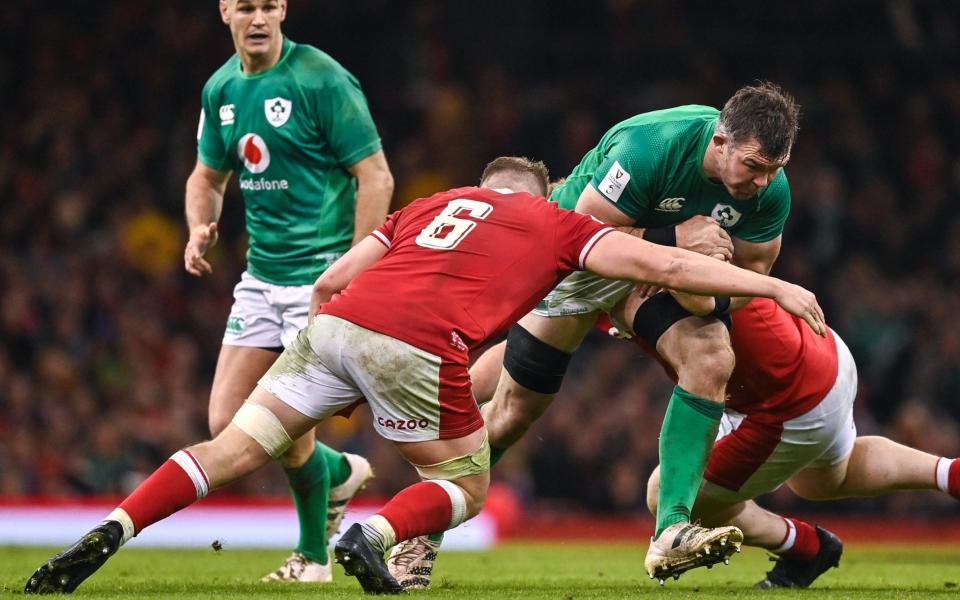Opensides are in vogue but the jackal is under threat from Six Nations referees

It’s nothing new to see Six Nations squads stacked with openside flankers. In fact it’s become almost a prerequisite for coaches to opt for poachers in their starting sides – think David Pocock and Michael Hooper for Australia, or Wales’ Sam Warbuton and Justin Tipuric, back in the day.
This trend was in full force once again during the opening round of the Six Nations. For Wales, it was Jac Morgan and Tipuric, while Scotland deployed Luke Crosbie and Jamie Ritchie.
Opensides are in vogue, but is it working? I’m not entirely convinced. There were just seven turnovers from flanker pairings during the opening round of the Championship, five of which came from jackals. England, concerningly, could not lay claim to any of them.
France, a team that is normally so dominant on the floor, had a tough day out in Rome, where the likes of Charles Ollivon and Anthony Jelonch were on the receiving end of Matthew Carley’s stringent refereeing around the breakdown – a telling sign that referees are cracking down on players’ ability to poach. Wales, meanwhile, weren’t able to slow down Ireland’s ball and turnovers from a flanker were few and far between, with Morgan managing just the one.
Battle of the breakdown
A good openside will know when there is an opportunity to jackal the ball, and when to back off and keep the defensive line. They need to be mobile, relish the contact and, crucially, be receptive to turnover ball when attacking the breakdown. It’s almost as if there is too much emphasis being placed on winning turnovers as opposed to simply being effective in the collision and slowing the opposition’s ball down.
Scotland were particularly effective at the latter against England. While turnovers were scarce, Crosbie and Ritchie busied themselves around the breakdown far more than their English counterparts. The figures bear this out: the Scottish duo succeeded in slowing down England’s ruck on no less than five occasions.
In order to win a breakdown, you have to win the collision and you do that by not allowing the tackler to dominate your momentum and carry with intent. England didn’t always do that at Twickenham last weekend, at times I sensed a hesitation among their ball-carriers which made them more vulnerable.
A prime example of this came 13 minutes in, when Ollie Hassell-Collins collected the ball from a kick and ran slightly away from his support down the outside 15 metre channel and went into contact rather statically. It led to an instant turnover from Scotland’s Ben White and Stuart Hogg, who were positioned ready to poach.
Time to bulk up
There has to be a change in approach for this weekend’s game against Italy, which is a must-win match if England are to avoid being booed off the pitch again.
Ben Curry is a fine flanker, but against Scotland he got caught out a few times, which has resulted in his omission for the visit of Italy to Twickenham this weekend. No more so was this evident than with Ben White’s try, where Curry flew out of the defensive line, allowing the Scotland scrum-half to scoot towards the whitewash. Many corners have pointed out how Ben is not as bulky as his brother, Tom. I am also one of those who think England need a bit more bulk in that position.
By contrast, Lewis Ludlam was England’s best forward on the day, along with Ollie Chessum. He looked strong and mobile in open play and acted as a link player. On that basis, he deserves to be given another run out at six.

I am not a fan of wholesale changes, but for me there should be a swap at seven. That’s where I’d slot in Ben Earl, put the returning Jack Willis on the bench - and, as Steve Borthwick has done, drop Curry entirely. Willis is an out-and-out poacher who is renowned for his breakdown craft. He’s capable of injecting a sense of urgency in England’s forward play that wasn’t always obvious against Scotland.
I’d caveat Curry’s omission by stressing one important point. As he begins to mould the team he inherited from Eddie Jones into one that is capable of winning Test matches, Steve Borthwick will need to avoid getting sucked into a merry-go-round of dropping players, only to bring them back. A hallmark of a good team is one that thrives off consistency when it comes to selection.
That’s why I’d keep Alex Dombrandt in this weekend. Dombrandt had a mixed game against Scotland – he spilled the ball a couple of times in open play and missed the final tackle on Duhan van der Merwe for his first try – but he became more lively in the second half and carried with intent. He didn’t get much of a look-in under Jones but he’s played well for Harlequins this season and given that Borthwick has openly stated his preference to pick players on form, I feel the Italy game would suit him.

